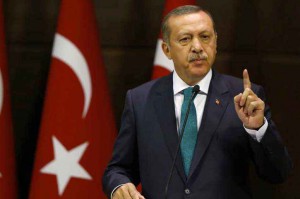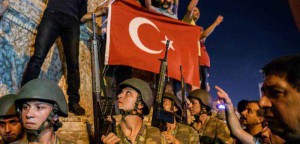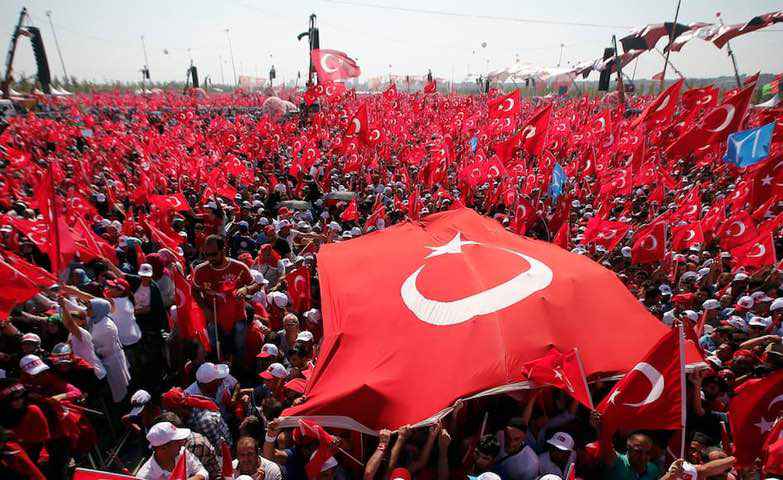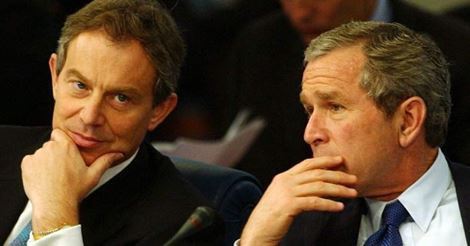It is difficult to think of a ‘Muslim’ society as progressive, modernist and liberal as Turkey has traditionally been, particularly as it is also a democracy.
This makes Turkey a relatively unique society in the world and a positive example of how moderate Sunni Islam and modern democratic and secular government and principles can co-exist harmoniously in a society.
At a time when Muslim countries elsewhere are either harsh dictatorships, nations in a state of collapse or war, or aspiring-but-failing quasi-democracies, a Turkey true to its principles would stand as something of a shining beacon of both secular democracy and the modern-day capacity for a Muslim society to exist effectively and happily in that state of secular democracy.
Also given its unique position as the literal bridge between Europe and the Middle East, such a Turkey would, in these highly toxic and increasingly sectarian times, be all the more important and valuable, with a great capacity to play peacemaker and bridge-builder.
I’ve written that, or some variation on that statement, several times in recent years, whenever the subject of Turkey and its increasingly worrying trends comes up. Because it is true, and it is important.
Unfortunately, all of that has been disappearing at a rapid rate. And it soon might be gone completely – at a time, perhaps, when it is needed the most to still be there.
President Erdogan always seemed set to win this recent referendum in Turkey, which drastically alters the dynamics of Turkish politics. Erdogan already holds enormous power under a continuing state of emergency following last year’s failed coup attempt. But now, parliament, the judiciary and other power structures in Turkey will be brought under full control by Erdogan’s “executive presidency”.
Claims of a fraudulent process and vote rigging were also predictable, because practically everything Erdogan does invites suspicion from those who legitimately fear that the AKP is drastically transforming Turkey against their wishes. A piece in The Independent notes, ‘The most unexpected aspect of the poll on Sunday was not the declared outcome, but that the ruling AKP (Justice and Development Party) allegedly found it necessary to fix the vote quite so blatantly.’
Official international election observers claim that the vote was fraudulent (see PDF).
If, as the numerous claims suggest, there was massive vote rigging going on, then the fact that the ‘yes’ vote only won by a paltry 51% indicates that a significant majority would’ve voted ‘no’. Bear in mind that this result should’ve been a piece of cake for Erdogan and his supporters – scores of opposition politicians, civil servants, journalists, academics, have been jailed, opposition media has been shut down, and some political groups have been proscribed.
In effect, all state institutions and media were on President Erdogan’s side – and yet his constitutional reform only won by 51%. This seems to indicate that the majority must’ve voted against it.
The opposition says that at least 1.5 million votes should be voided as they bore no stamp authenticating them. They also claim to have evidence of widespread ballot-box stuffing and other tricks that pushed the result in favour of Erdogan.
However, with Erdogan’s party in control of virtually all institutions, including both the judiciary and the media, it is unlikely these claims of a fraudulent result will be able to reverse the outcome.
_______________
When I think of what’s gone on in Turkey in recent years, it makes me very sad – largely for the reasons stated at the beginning of this article. Now, more than ever, so many of us would like to see Turkey remain a secular, pluralistic, liberal democracy, both for the good of its own citizens and for the broader good of the region, the Europe/Middle-East dynamics and the strife-addled Islamic world.
However, I think it is also fair to say that this situation that has unfolded in Turkey in the last few years isn’t just simply or solely a result of Erdogan’s machinations: but also a symptom of broader instability, toxicity and strife that has engulfed the Middle East and is now also destabilising Europe and even America.
In the last few years, it increasingly seems like everything is being turned on its head, with all kinds of longstanding certainties and assumptions being unseated and some very unfortunate and undesirable changes occurring.
Turkey, literally part of both Europe and the Middle East, has been subject to this too.
In multiple countries there is a danger that populations are gravitating towards both nationalism and the ‘strongman’/saviour archetype and away from faith in political systems, longstanding common values or aspirations, and international relations.

There is no denying that President Erdogan does genuinely have a massive amount of support.
Ask many in Turkey and they will argue that Erdogan has done a great deal of good in the country and in various respects, including economically and in terms of infrastructure building. He is also effectively doing what any number of successful dictators or ‘strongmen’ rulers do, which is to amplify and tap into a sense of national pride and nationalistic fervor.
We appear, in fact, to be re-entering into that kind of era, with leaders like Vladimir Putin, Donald Trump and others doing essentially the same thing, albeit to different degrees. The key, in all of these cases, is to bypass the major cities and the metropolitan demographics and to focus exclusively on rural areas and conservative mindsets, where both traditional religious values and nationalistic ideals are much stronger.
In that respect, the rust-belt voters in America and the rural Erdogan supporters are essentially the same sort of demographic.
When the liberals and progressives in the big cities – in Turkey’s case, Istanbul, Izmir and Ankara – find themselves outnumbered by the broader population, the problem is that their concerns about democracy, rule of law, the constitution, rights, minorities, etc, become drowned out by the rural masses, who seem to have a very different outlook, very different interests and a very different experience.
Which is not to say that one is right and the other wrong – there is, arguably, legitimacy in both sets of attitudes.
But this is essentially how Erdogan has been able to mobilise so much genuine support – it’s the classic strongman or dictator method of bypassing or discrediting the liberals and academics and appealing to the sensibilities of the ‘good, simple country folk’.
And part of that is also in evoking the glory of the past – which is also a classic method most strongmen or would-be-dictator types use to capture those peoples’ imaginations and passions.
Again, Trump did basically the same thing – evoking the ‘better days’ of the past and promising a return to those better days (Make America Great Again) as a recipe for a strong, powerful nation and a sense of pride. Again, there is a sense that this – or some version of this – is happening everywhere; or that it is in danger of happening everywhere.

Again, what is happening in Turkey should be seen as part of a negative, toxic atmosphere that appears to be spreading everywhere.
It is notable that Donald Trump called Erdogan to congratulate him in a conversation said to have lasted 45 minutes – and this being after Trump’s own State Department had expressed concern over the dubiousness of the situation in Turkey.
What Erdogan has also done very well – and it’s yet another classic strongman/dictator-like method – is to play on a sense of Turkey being mistreated or disrespected by other countries and societies, be it America, be it the European Union or be it some of the Middle Eastern countries. In most cases – and, again, Trump was doing this too – this is usually aimed at creating a siege mentality, a perceived need for someone to stand up for the country’s honour and its interests, and a mistrust of or disdain for the outside world, demanding a greater sense of national pride and identity (with the strongman himself establishing himself as the symbol or mascot of that national identity or pride).
Many see him – rightly or wrongly – as a strong leader because he is someone who they perceive protects Turkey from foreign plots and impositions and as someone who safeguards the national interest.
And, although there’s no question that he has been involved in sequential stages of a power grab designed around his own ambitions, there is also a genuine case to be made that he is also safeguarding Turkey against a different threat.
The situation and dynamics in Turkey are more complicated than they appear on first glance. While many international commentators talk about the ‘Sultan’ Erdogan’s move towards dictatorship, what is often absent from the discussion is the genuine threat posed by the Gulenist movement – a foreign hosted movement that itself may have very dubious connections and intentions, as previously discussed at length.
This is in contrast to Erdogan’s ‘movement’, which, at the very least, can be regarded as a Turkish nationalist movement with vast support within rural Turkey.
In other words, while Erdogan is no doubt abusing the threat of the Gulenists as a means by which to crack down on all opposition and criticism in Turkey and acquire more and more power for himself, that threat is actually real and could, according to some, be just as dangerous – or even more dangerous – than what Erdogan and his party are doing.
I covered that subject in this article after the failed ‘coup’ attempt last year, in which it seems clear that the Gulenist movement might be the bigger threat – not just to Turkey, but internationally.
Which is not to justify what has been happening under Erdogan. I still think it’s possible, as many do, that the failed coup attempt was a staged sham designed to give him the state of emergency and the platform for purging all of the country’s major institutions of any opposition to his plans.

All of which further illustrates what I wrote after that coup attempt and subsequent crackdown: that we live, to quote Orwell, in ‘an age of universal deceit’, in which there aren’t necessarily Good Guys and Bad Guys, just rival forces and dueling machinations, and lots of grey areas.
Regardless of all that, however, what has happened lately in Turkey is both troubling and sad.
Regardless of any justifications there might be for Erdogan’s agenda, the fact remains that what was until fairly recently a secular, liberal democracy is being taken in a very different direction – from which it might not come back.
Instead, Turkey is being taken down the path of hardline nationalism and political Islamism. And, at the same time, with all of the government’s crackdowns on opposition politicians, newspapers and media, academics, its purges of the military and its move to reinstate the death penalty, Erdogan’s Turkey has lost any hope of joining the EU, turning its back on its place as a European nation.
Interestingly, on that note, one relationship that Erdogan’s government does appear to have substantially improved on is its relationship with Israel.
I wrote at length previously about the extremist government in Israel and its connection with nationalist parties like the Front National in France, Geert Wilders and the Trump/Bannon campaign and also about how the right-wing nationalists in Israel appear to be actively operating against liberal governments and possibly aiming to undermine a European Union that has adopted a strong position against illegal Israeli activity.
A recent article I came across revealed what appears to be a planned Israel-Turkey-Cyprus pipeline, which a former Ambassador claims is going to create a new ‘strategic triangle’.
This doesn’t have much to do with Erdogan’s domestic actions in general or the planned changes to the constitution; but it does suggest the possibility that Turkey’s alignment away from the EU may bring it more into alignment with an Israeli government that also has a very hostile view of the European Union.
Like I said earlier, there are strange forces at work: it seems like everything everywhere is being turned on its head, with all kinds of longstanding certainties and assumptions being unseated and some very unfortunate and undesirable changes occurring.
__________________





Of course Erdogan is fascist like dictator,
and these societes which are non-european most of the time need a iron grip like dictators,
tough govts, because athey are – mostly, sadly- very primitive people with tribal mentality…
this is their KARMA, anyway – of course it doesn’t mean that they CANNOT do nothing about it :
like Eastern europeans karma wa s to be controlled by Russia :
now for a quarter of century by ther uncle sam haha…geopolitics they say,
but – on the higher, spiritual level, this is karma.
(Living in France and i know what i mean.)
Opposite to our, European. So north african countries need, and turkey also a strong govt:
democracy is neither for such a countries, neither Russia…
Democ-crazy, but still better than Turkey.
And Erdogan is crypto Jew, and jewish state arse licker. Liars and demons, that’s who they are.
Many good people in Turkey,of course… and many left after the putsch, if they can.
NO for Turkey in in EU !
Of course primitive Turks support Erdogan en masse,
but they are not aware how big dickhead and rascal is he.
Pls see Site of muslim vegan, if you’re muslim :
karma is karma, halal is total barbarism and few muslims are aware of this.
Greetings,